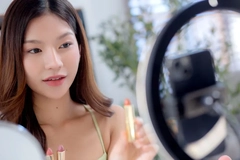Fukushima fears: Chinese social media boycotts Japanese beauty brands over nuclear contamination concerns

30 Aug 2023 --- Chinese users on social media platforms have championed a viral boycott campaign against Japanese personal care brands. The backlash comes as a result of Japan’s controversial release of treated wastewater from the Fukushima nuclear power plant into the Pacific Ocean last week.
Chinese citizens are compiling blacklists of Japanese beauty brands to no longer purchase from, out of fear that the products contain radioactive materials. These allegations remain unproven, with some experts flagging the boycott as a cause of Chinese nationalism.
Moreover, the UN’s International Atomic Energy Agency (IAEA) concluded that Japan’s release of treated water stored at the Fukushima nuclear power station into the sea is safe.

“The IAEA notes the controlled, gradual discharges of the treated water to the sea…would have a negligible radiological impact on people and the environment,” says Rafael Mariano Grossi, IAEA director general.
The subject has attracted approximately 300 million views on Weibo, China’s equivalent of Twitter.
 Chinese social media users are boycotting Japanese beauty products after the Fukushima nuclear plant released wastewater into the ocean. Fear of radiation
Chinese social media users are boycotting Japanese beauty products after the Fukushima nuclear plant released wastewater into the ocean. Fear of radiation
The Fukushima nuclear plant was destroyed after the Tōhoku earthquake and tsunami on March 11, 2011. As a result, over 30,000 metric tons of treated nuclear wastewater was let into the Pacific Ocean. The process of releasing the wastewater is expected to take over 30 years.
Japanese scientists and officials report that the wastewater is safe. Testing by Tokyo Electric Power Company and government agencies has found no detectable radioactivity in seawater and fish samples taken after the release.
However, this reassurance is not convincing for many Chinese social media users. Manufacturers are declaring products “radiation-free” in response to some buyers testing products with handheld Geiger counters – an electronic instrument used for detecting and measuring ionizing radiation.
Some experts flag that the fear may come from a nationalist sentiment alongside contamination fears.
Suisheng Zhao, a scholar at the University of Denver, US, told The Washington Post that for many decades, China’s leaders relied equally on economic performance and nationalism to legitimize Chinese Communist Party rule. The country’s mounting economic headwinds now mean Xi Jinping, President of China, must implement more “anti-foreign” nationalist expression.
Similar tensions have been observed in the food industry, with China’s ban on Japanese seafood imports in light of the Fukushima wastewater release.
Cost conjecture
Japanese beauty brands such as Shiseido and SK-II are currently facing online criticism.
Procter & Gamble, which owns SK-II, issued statements in China assuring the safety of their products following the radioactive speculation.
At the same time, Shiseido’s shares went down 6.8%, which was the company’s most signific Shiseido has launched Sightseeing Japanese Beauty for Chinese people to access information about Japan’s beauty.ant weekly stock plunge in almost ten months. Japanese chemicals company Pola Orbis Holdings and personal care company Kosé’s shares also fell over 3%.
Shiseido has launched Sightseeing Japanese Beauty for Chinese people to access information about Japan’s beauty.ant weekly stock plunge in almost ten months. Japanese chemicals company Pola Orbis Holdings and personal care company Kosé’s shares also fell over 3%.
The boycott may affect the US$4 billion exports of Japanese cosmetics to China.
Jeanie Chen, a senior equity analyst at Morningstar Research, says she didn’t think the impact on the Japanese brands will be substantial.
“Probably some people who are against Japan just try to take this opportunity to influence other people to boycott Japanese brands. But I think Chinese consumers are much more sophisticated these days.”
Attracting Chinese tourists
Recently, Shiseido launched Sightseeing Japanese Beauty, a platform to promote the beauty of Japan and Japanese culture to Chinese consumers. It features five categories: The senses, facial aesthetics, food, sceneries and products.
The platform was created in collaboration with partner companies in the airline, tourism, hotel and retail industries. It is operated via the WeChat Mini Program.
Shiseido says its reasoning for encouraging Chinese customers to explore Japanese culture is due to the COVID-19 pandemic. Overseas travel was restricted in China for an extended period, which resulted in the Chinese people having fewer opportunities to obtain information about Japan.
The personal care product company says Chinese citizens “are increasingly seeking opportunities to experience Japanese culture and services.”
By Sabine Waldeck













